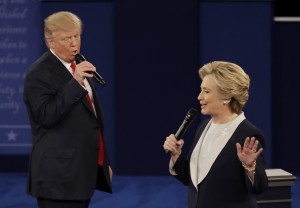 Last night’s presidential debate was a real low for American democracy, with the audience cheering Donald Trump’s threat to jail his political opponent, Hillary Clinton, once he’s elected. Members of the media seemed to highlight the shocking claim almost in passing, perhaps because they don’t quite realize that they’d be next in jail.
Last night’s presidential debate was a real low for American democracy, with the audience cheering Donald Trump’s threat to jail his political opponent, Hillary Clinton, once he’s elected. Members of the media seemed to highlight the shocking claim almost in passing, perhaps because they don’t quite realize that they’d be next in jail.
But aside from these chilling words, there was actually a bit of substantive discussion in the debate, too. The second-to-last question on energy policy in particular caught my attention. Trump answered first, and Grist helpfully broke down the amazing amount of falsehoods in his reply:
• Trump: “[E]nergy is under siege by the Obama administration. … We are killing, absolutely killing, our energy business in this country.”
In fact: Total U.S. energy production has increased for the last six years in a row. The oil and gas sector has been booming during the Obama presidency, as have the solar and wind industries. Coal companies have been struggling — but that is largely not the fault of President Obama, just as the oil boom is largely not something he can take credit for.
• Trump: “I will bring our energy companies back. … They will make money. They will pay off our national debt. They will pay off our tremendous budget deficits.”
In fact: There is no remotely credible economic analysis to suggest that Trump’s proposals for expanded domestic fossil fuel extraction would generate enough additional tax revenue to close the budget deficit, much less pay off the existing national debt. It’s particularly implausible when you consider Trump’s massive tax-cut plans that would make both the deficit and debt considerably larger.
• Trump: “I’m all for alternative forms of energy, including wind, including solar, etc.”
In fact: Trump’s energy plan offers nothing to increase solar or wind energy production, but instead focuses on boosting fossil fuels.
• Trump: “There is a thing called clean coal.”
In fact: The hope that coal plants’ carbon emissions can be drastically reduced — either through technology that captures and sequesters the emissions or that converts coal to synthetic gas — burns eternal for the coal industry’s cheerleaders. But no one has actually significantly cut emissions at an economically viable coal plant. The promises of “clean coal” projects have not been fulfilled.
• Trump: “Foreign companies are now coming in and buying so many of our different plants, and then rejiggering the plant so they can take care of their oil.”
In fact: What is Trump trying to say with this gibberish? We have no idea.
But lest we automatically assume Clinton’s answer pleased the environmental community, she made two comments that raised some hackles. First, she described natural gas as a “bridge” to cleaner fuels, which many environmentalists dispute due to the methane and other emissions involved. Second, she described the United States as “energy independent” when we’re still a net importer of crude oil and petroleum.
Still, the candidates are miles apart on this issue, as my colleague Dan Farber describes on Legal Planet, with Clinton the only real choice for those who care about the environment.
This is not a typical election with the usual policy disagreements among the candidates. Instead, it’s a race between two major party candidates with vastly different levels of respect for our American democracy and values. We shouldn’t overlook that fundamental difference, but we should also still use the occasion to talk about important issues like energy — and note the stark differences among the candidates’ views.
Leave a Reply
You must be logged in to post a comment.


